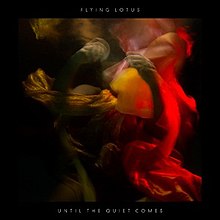| Until the Quiet Comes | ||||
|---|---|---|---|---|
 | ||||
| Studio album by | ||||
| Released | September 26, 2012 | |||
| Recorded | 2011–12 | |||
| Studio | Home recording (Mount Washington) | |||
| Genre | ||||
| Length | 46:42 | |||
| Label | Warp | |||
| Producer | Flying Lotus | |||
| Flying Lotus chronology | ||||
| ||||
| Singles from Until the Quiet Comes | ||||
| ||||
Until the Quiet Comes is the fourth studio album by American electronic music producer Flying Lotus, released on September 26, 2012 by Warp Records. Flying Lotus was inspired to create the album by psychedelic music, African percussion, and concepts of the human subconscious and dream world. He recorded for two years at his home in Los Angeles, experimenting with different mixing techniques and dynamics while primarily using an Ableton Live sequencer along with other instruments and software. The producer was accompanied on certain songs by guest vocalists, including Erykah Badu, Thom Yorke, and Laura Darlington. The album also continued his creative partnership with bassist Thundercat, who had appeared on Flying Lotus' 2010 record Cosmogramma.
An electronic jazz album, Until the Quiet Comes features free jazz elements, varying musical tones, contrasting scales, and shifts in rhythmic feel. Its songs are sequenced together and characterized by what music journalists noted to be ghostly vocal production, irregular drum beats, pulsating percussive textures, trembling basslines, trilled synthesizers, and fluctuating samples. The album has a journey-like concept and dreamy musical narrative, which Flying Lotus conceived while imagining himself in the process of astral projection. He later said the album could be interpreted uniquely by listeners; it has been interpreted by writers as a musical accompaniment to dreams and a process of emotional introspection by the producer.
Until the Quiet Comes was marketed with two singles and a short film featuring music from the album. Flying Lotus also promoted the album with an international concert tour from October to November 2012, performing at venues in North America and abroad. The album debuted at number 34 on the Billboard 200 and sold 13,000 copies in its first week of release. It was a widespread critical success, receiving praise for its complex music and Flying Lotus' sound engineering.
- ^ Christgau, Robert (February 19, 2013). "Odds and Ends 024". MSN Music. Microsoft. Archived from the original on March 23, 2013. Retrieved March 15, 2013.
- ^ Cite error: The named reference
Ensallwas invoked but never defined (see the help page). - ^ Lawrence, Eddy (September 27, 2012). "Tune in, psych out: the new black psychedelia". The Guardian. London. section G2, p. 14. Retrieved January 24, 2019.